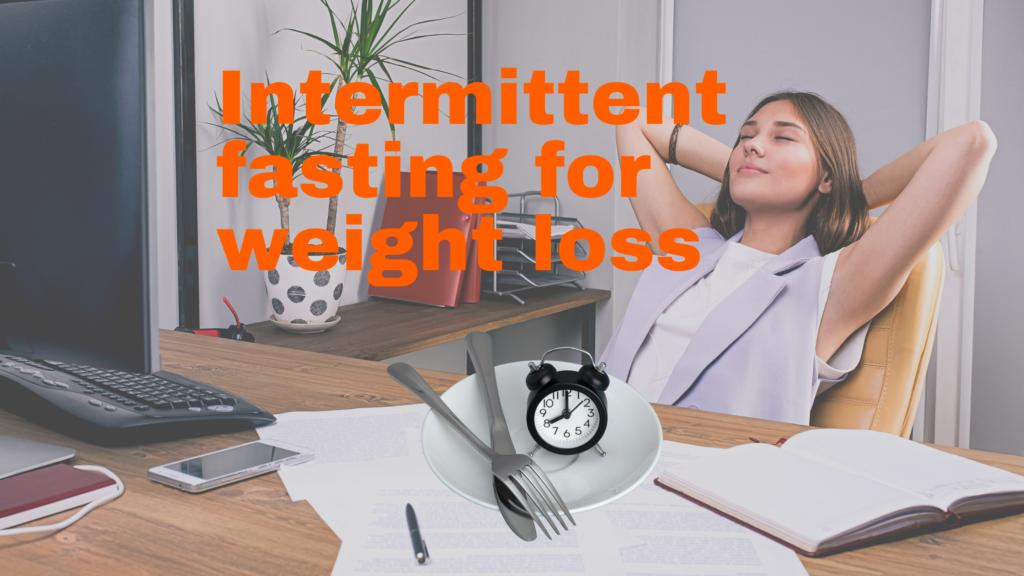Intermittent fasting for weight loss simply means going without food for a certain period of time. It can be for specific hours in a day or certain days in a week.
Fasting is refraining from eating and sometimes from drinking, intentionally or unplanned.
Almost everyone has fasted one way or the other, unaware or purposely. Sometimes we drown in work to the extent that we cannot even eat. Busy students preparing for exams sometimes do not eat. That is fasting.
How does it work?
Intermittent fasting for weight loss works in such a way that it allows the body to burn the stored fat. The time between the last meal before the fast and the meal that is breaking the fast is golden.
That is when the body burns the calories consumed from the last meal and starts to burn the stored fat. This is how the weight gets lost happens. Burning the stored fat means extra calories are being shed.
It reduces sugar in the blood and stabilizes it, as a result, insulin also gets reduced. It even lowers cholesterol. Meaning some lifestyle diseases like high blood pressure, and diabetes type 2 can be managed.
Like any other program, we are not supposed to use it in isolation so that we can see the results. Intermittent fasting works on its own but it is even better if is paired with eating healthy meals. Working out also complements it very well.
Benefits of intermittent fasting
There are several health benefits that are linked to intermittent fasting. It goes far beyond burning fat for weight loss.
Below are some of the benefits that come with intermittent fasting.
-
Weight loss
– Taking fewer calories may result in weight loss. Since intermittent fasting allows eating within a certain period only, it means one will only be able to eat fewer meals than when they were not fasting. That will happen if they do not compensate for the time they were not supposed to eat.
It also helps by lowering the insulin level and improving the metabolism process. As a result, calories from the last meal get burned quickly and the stored fat gets burned.
It is effective for reducing belly fat too.
-
Sharp Brain
– Healthy body leads to a healthy mind. When the blood sugar level and insulin level are reduced, the metabolic process improves. That may lead to improving the brain.
Intermittent fasting may also encourage the growth of nerve cells. These new nerve cells are very important to brain health.
-
Type 2 Diabetes
– Insulin resistance is the main cause of type 2 diabetes. This life-threatening disease can lead to blindness.
Anything that lowers blood sugar levels, improves insulin resistance. As a result, this will reduce the risk of type 2 diabetes.
Amazingly, one of the main benefits of intermittent fasting is reducing insulin resistance. Therefore, that may lead to stabilizing blood sugar levels and improving type 2 diabetes.
People who have been diagnosed with both type 1 and type 2 diabetes should consult with their doctors before they can take part in intermittent fasting. The reason being if their blood sugar gets low that becomes a high-risk factor for them. The medication they take already works on controlling insulin.
-
High blood pressure
– The study conducted has proven that long-term fasting can reduce high blood pressure. Consistency is key with intermittent fasting so as to get the expected results.
Even when the subjects in the study stopped taking their antihypertensive medication, their blood pressure decreased.
3 Common methods of Intermittent fasting
Below are the three different methods of intermittent fasting for weight loss. They are all effective, it entirely depends on the individual preference on which one to use.
1. Time-restricted eating plan
This is the most popular method of intermitted fasting for weight loss. It only restricts the eating time to a certain number of hours per day. Therefore, you can eat any amount of calories during the time that you are allowed to eat.
The 16/8 plan
In this plan, the eating period is restricted to 8 hours per day followed by 16 hours of fasting. It becomes easier when the most fasting hours are at night. For example, one can eat between 1000hrs and 1800hrs, then fast for the remaining hours.
As the body adjusts and gets used to fasting, one can reduce the eating period and increase the fasting hours. This will increase the possibility of losing weight. For instance, make the eating period 4 hours and fast for 20 hours.
Eating healthy food is advisable so that one can get the full health advantage of fasting.
2. Alternate day fasting
This method includes unrestricted eating followed by a fasting day. You are only allowed to consume 500 calories on the day that you fasting.
Some people do not eat all on the fasting day. It depends on the individual.
Adding some form of exercise can really help in busting the weight loss process and improving the health benefits.
It is one of the most challenging methods but is doable.
3. Modified fasting
This is the modified method of alternate-day fasting.
The 5/2 plan involves eating normally for five days and fasting two days per week. There must be a day or two of non-fasting between the fasting days.
On the fasting day, you can eat one meal that has 500 calories. You can also drink water and beverages that do not have calories. It includes green tea and lemon tea.
This is the most effective form of intermittent fasting, especially when it is paired with a healthy diet and exercise.
Remember that on the eating days you should not compensate for the fasting days.
Side effects of intermitted fasting
There are side effects of intermittent fasting including;
- Headaches
- Constipation
- Dizziness
- Fatigue
- The menstrual circle may change
- Dehydration
These side effects of intermittent will become lower when the body adjusts and gets used to fasting.
Is intermittent fasting for everyone?
Not all of us can be able to participate in intermitted fasting.
It is important to check with the doctor before one can start intermittent fasting.
Several people should not fast, those are
- Pregnant women or breastfeeding
- Low blood pressure patients
- Children under the age of 12
- Underweight people
- People with diabetes
- People with a history of eating disorders
- Those who are taking medication

